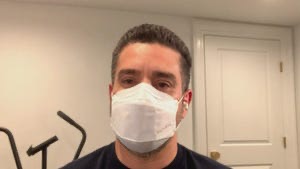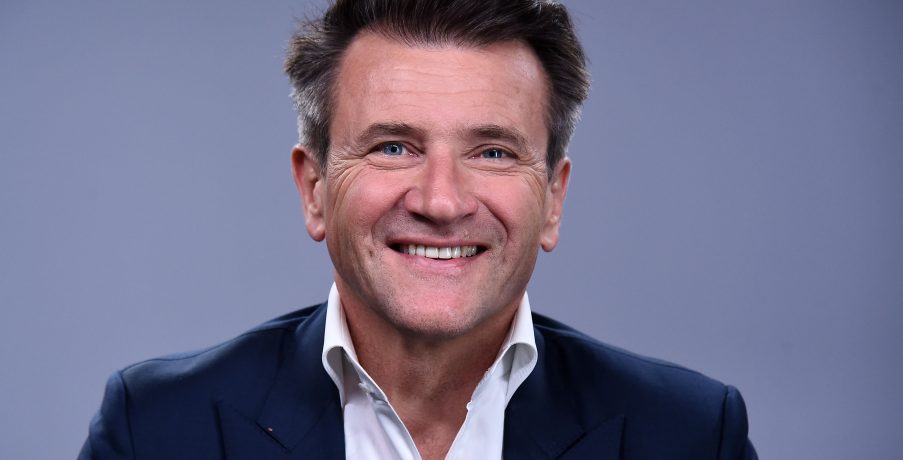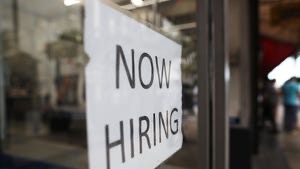
Neil A. Carousso produces NewsNation original “Kurt’s Country” – a celebration of country music and a slice of Americana with host Kurt Bardella.
-
Bronx Native Develops Highly Effective Mask to Slow Community Spread of COVID-19
Post Views: 867By Neil A. Carousso
NEW YORK (WCBS 880) — Not all masks provide equal protection.
Serial entrepreneur Jonathan Malveaux developed the Nano Air Mask at the outset of the pandemic as a way to bring a quality mask that blocks most viral particles to the general public. It is made using nanofiber technology.
“Whether you’re using a gaiter or some other cloth material, these very microscopic-size particles will get through it,” he explained.
Malveaux, whose mother and step-mother are nurses, realized the importance of masks in protecting oneself and others early in the pandemic even before public officials and the Centers for Disease Control and Protection advised Americans to wear masks to slow transmission.
“We just sprung into action. It was like survival mode,” he told WCBS 880’s Neil A. Carousso, recalling walking around the South Bronx neighborhood where he was raised wearing a mask before it became required by state law on public transportation and in establishments.
If there was more comfortable and breathable mask that provided strong protection against COVID-19, would you wear it? @NeilACarousso reports on the Nano Air Mask. https://t.co/3wmYsMWXSj pic.twitter.com/uANv7Zfii5
— WCBS 880 (@wcbs880) December 10, 2020
Florida Atlantic University researchers compared the Nano Air Mask with a cloth mask and summer face mask on mannequins in a visual cough simulation of how respiratory droplets would seep through a mask, potentially infecting those nearby with COVID-19. They found the Nano Air Mask best reduced how far droplets travel. Utah-based Nelson Labs performed an independent study and found it to be roughly 98 percent effective in filtering particles.
“The sort of issue that we all have to be focused on as well is leakage,” said Malveaux of how viral particles could penetrate the sides of the mask.
He leads a small team that manufactures the Nano Air Mask in Long Beach, CA; they are ramping up production as COVID-19 cases, hospitalizations and deaths soar nationwide. They are also working on a “pro version” for healthcare professionals similar to an N95 respirator, which is FDA-approved, featuring two straps that go around one’s head to reduce “leakage.”
“We’re really constantly innovating to make sure that we are offering exactly what (our customers) want,” Malveaux said. “The one thing that we won’t compromise on is the quality.”
He is perfecting the Nano Air Mask and will come out with a black colored version soon after numerous inquiries from his customers. Currently, the masks are only available in white. It costs $2.75 down from the original price of $4.50.
Malveaux looks forward to the day when we do not have to wear masks, but right now, his goal is universal mask compliance, which epidemiologists say is the key to reducing the risk of COVID-19 infection. He could envision people going out in public and attending events next year while wearing a high quality mask that will maintain a low transmission rate.
“We supply to lots of professional sports teams, athletes and owners across most major sports, which is fantastic; they have the resources to do the diligence quite quickly,” he said, adding, “Given how we grew up and what we were seeing – I grew up in the South Bronx – we wanted to not only do what would work for them, but also was affordable and would actually try to help make a difference.”
-
Flatiron District Businesses Brace for Second Wave of COVID-19
Post Views: 774By Neil A. Carousso
NEW YORK (WCBS 880) — The Flatiron District – world-famous for being a vibrant technology hub, higher education center and home to restaurants, retail and tourism – is now bracing for a surge in COVID-19 infections and hospitalizations that could lead to industry shutdowns as a measure to help quell the spread.
James Mettham, executive director of the Flatiron/23rd Street Partnership, told Joe Connolly and Neil A. Carousso on the WCBS Small Business Spotlight, sponsored by BNB Bank, that a second shutdown without “true relief” in the form of forgivable federal government loans or grants, which would need to passed by Congress, would stifle business recovery.
“It’s really a call for emergency action as we hit the ledge here,” Mettham said.The Business Improvement District says 75 percent of ground-floor food, retail and services businesses have reopened or never shutdown, deemed essential, in the spring. They had to pivot in March to survive.
Small businesses that already had an e-commerce platform are best positioned to stay afloat; others are catching up and struggling to compete with Amazon, Wal-Mart and other large companies that have seen sales accelerate in the pandemic. Amazon’s sales are up 53 percent while Wal-Mart, with a growing e-commerce site, has seen sales rise 45 percent.
Mettham told WCBS 880 some food businesses in the Flatiron District have had success through so-called “re-targeting.”
“It’s been really trying to push their goods towards local residents – folks that they can rely on being in the neighborhood and familiar with their business,” he explained.
Loyalty initiatives have also helped stores attract customers who want to support their local businesses.
Many, though, say commercial rent prices must come down for businesses to survive and new businesses to thrive.
“Landlords and tenants both understand that a vibrant neighborhood that’s occupied with a mix of uses ranging with office workers, hospitality, visitors (and) students is all in the best interest of everyone,” Mettham said.
He told Connolly and Carousso several new restaurants have taken advantage of reduced entry costs and opened their doors in the Flatiron District. The BID veteran believes the two sides will negotiate and come to an agreement because the local economy depends on it; the pandemic has underscored how one industry impacts the other in a connected economy like New York.
Before joining the Flatiron District/23rd Street Partnership, Mettham served as managing director of finance and operations at the Downtown Brooklyn Partnership. He was also assistant commissioner of the New York City Department of Small Business Services (SBS) Neighborhood Development Division and executive director of SBS’ Business Improvement District Program.
On the WCBS Small Business Spotlight, Mettham talks about the Flatiron District with reverence of its history and promise for a post-pandemic city. He sees new technology companies entering the previously bustling neighborhood, which he believes is reminiscent of the tech boom in the 1990s in Manhattan South, which earned it the moniker “Silicon Alley.”
“It’s been very both resilient and flexible and innovative in its character over the years,” Mettham said, continuing, “Whether it’s been from the photography industry, the table top industry, original Silicon Alley 20 years ago, it’s always been able to build on its successes, reinvent itself and I don’t think this is going to require a full reinvention.”
Hear more about the new businesses opening in the Flatiron District and how existing ones are bracing for the second wave of the pandemic on the WCBS Small Business Spotlight Podcast on the RADIO.COM app or on the media player above.
-
Robert Herjavec’s pandemic advice to business owners: ‘When you’re going through hell… keep going’
In Best Of, Featured, Guest, Interview, Latest, News Stories, Technology, The World, Top News, videosPost Views: 1,025By Neil A. Carousso
NEW YORK (WCBS 880) — “Shark Tank” star Robert Herjavec believes the coronavirus pandemic presents an opportunity for entrepreneurs to fill needs and shares his advice for overcoming adversity on the WCBS Small Business Spotlight, sponsored by BNB Bank.
“Whatever you start doing today, your business will not be doing that in a year. Things change. The world changes. You have to adapt,” he said, adding he prefers to invest in individuals rather than single businesses on ABC’s “Shark Tank” for that reason.
“The entrepreneur will always figure out the path and the entrepreneur will build a great team in order to figure out the path,” he said.
Herjavec told Joe Connolly and Neil A. Carousso he started his first business after he was fired and needed to make a mortgage payment. He started other businesses in economic recessions.
“In this kind of a time, don’t perfect your product, don’t spend all this time on your management team or buying better software to run your business. Go sell something,” the self-made entrepreneur emphasized when asked for his advice for owners. “Sales cures all ills and the harder the economy, the harder the macro conditions, the more you need sales.”
A record 80,820 Americans have taken the first steps into entrepreneurship this year; that’s 30.6 percent more new business applications than all of 2019, according to the U.S. Census Bureau.
Herjavec represents the embodiment of the American Dream. His family escaped the former Communist country Yugoslavia in 1970 when Robert was eight years old. His father was a successful manager in Yugoslavia, but was jailed 22 times for speaking out about the dangers of communism. They immigrated to Canada where Robert’s father Vladimir swept floors in a factory.
His upbringing shaped Robert as a kid who sought to make something out of nothing, later founding BRAK Systems, which he sold to then-AT&T Canada in 2000 for $30.2 million. He currently runs the Herjavec Group – a global cybersecurity firm with its headquarters in Toronto, Canada.
“I’ve been through hell and I’ve been through some really hard times,” he told WCBS 880, recalling advice he lives by, “When you’re going through hell, you’ve just got to keep going.”
Herjavec told Connolly and Carousso that business owners who are struggling right now should take an honest assessment of the company and the market and be in contact with their customers regularly.
“The worst thing you can do in this time is nothing,” he said, continuing, “Don’t let fear overcome you to the point that you’re that deer in the headlights. You just got to keep going.”
Herjavec says he and his fellow Sharks did not know if their businesses would survive at the outset of the pandemic. He has not seen his employees in-person since February 17.
“I’m running a $300 million business; I haven’t seen a single employee,” he said from his Los Angeles home, noting it’s difficult to motivate his remote Herjavec Group team on video calls. So, Herjavec began expressing his appreciation through premium, savory cookies and brownies from Bake Me A Wish – a New York-based company whose mission is centered on expressing gratitude and appreciation for employees and colleagues.
“My dad was this blue collar guy, worked really hard, swept floors in a factory, and he always said to me, ‘You should thank people for the opportunity,'” he explained, adding, “I was just looking for a way to say thank you.”
Now, the ‘Shark Tank’ star is extending personalized gift baskets to companies who want to share their appreciation for their workers ahead of the unprecedented holidays. You can see Bake Me A Wish’s corporate catalogue, endorsed by Herjavec, here.
“You don’t have to be a jerk, you don’t have to be mean and I think it’s the opposite,” the Shark said of succeeding in business. “You’ve got to empower people. You’ve got to lead people. You have to give people vision of where they want to go.”
Watch Joe Connolly and Neil A. Carousso’s conversation with Robert Herjavec above for more business advice and keys to pitching your idea, product or business on “Shark Tank” or any boardroom.
-
Laughter and Love: Businesses Born Out of Pandemic Needs
Post Views: 872By Neil A. Carousso
NEW YORK (WCBS 880) — Some of the best businesses solve unmet needs.
Ray Ellin, executive producer of Comedy Central’s “This Week at the Comedy Cellar,” went from performing at New York comedy clubs to entertaining sales teams on Zoom after founding Comedy Cloud in May when a customer insisted he pivot to live virtual comedy shows.
“I had thought about it, but I was like, ‘There’s no way this is going to work,’” Ellin told Joe Connolly and Neil A. Carousso on the WCBS Small Business Spotlight, sponsored by BNB Bank.
He did not think Zoom comedy shows for businesses would be profitable, but now, he credits his Aruba Ray’s Comedy Club customer to his growing adjacent service.
“He really had to twist my arm. It was really something,” Ellin laughed.

Photo credit: Ray Ellin Businesses hire him for about $2,000 to provide hour-long comedic relief and engage their remote workers – many of whom have not been in the office for eight months – in a fast-pace virtual program featuring standup comics sidelined due to the pandemic. It has also served as a coping mechanism for Ellin whose older sister died from COVID-19 in March in Silicon Valley.
“I really felt like this would also provide me with a good purpose,” he told WCBS 880, continuing, “If I could try to boost the morale of people that are home alone in a similar situation, well, great, let’s give it a shot. Let’s see if this will work.”
Jenn Augustine of Floral Park has tackled adversity head on since she started her dream wedding planning business Forget Me Knots in 2018 while receiving chemotherapy and radiation treatments for breast cancer and carrying her first child at the same time.
“The first wedding that we ever booked, we did it in September, and a day later I had my double mastectomy,” she said, adding. “I wanted to make sure I was there and part of that wedding and loved every second of it.”

Photo credit: Jenn Augustine She has been cancer-free for two years this past September and her daughter is healthy as well.
When the pandemic hit, Augustine had been used to the mental health challenges of isolation, but her business was shut down. As Mother’s Day approached in May, she reached out to potential customers on Instagram with a new service: flowers. She wanted to support Long Island floral farmers she had been working with for wedding bouquets. She only expected a few orders, but was flooded with over 100 orders throughout the Tri-State area.
“There’s still a need for people to send joy and love and a lot of people do that through flowers,” said Augustine. “We realized that that side of the business really has been growing because when you don’t see a family member for a certain amount of time, you really appreciate them and the time that you do spend together, and you want them to remember, ‘Hey, I’m thinking about you.'”
Now, with weddings in New York capped at 50 people, including wait staff, she told Carousso her flower delivery business is more profitable. She is planning what she calls “micro-weddings” in clients’ backyards and small venues.
“I just recently did a wedding in Long Beach at the Allegria Hotel and they only allowed 40 people with 5-6 feet tables apart from each other, no dancing, you have to wear a mask when you get up from the table and they usually stay away from buffet-style eating. Everything is individually plated,” she said.
Augustine discovered micro-weddings are more intimate and fun because it is with a small group of close family and friends. Beaming with a positive outlook on life full of uncertainty, she fills the void of love.
Hear ideas for growing an adjacent service in the pandemic on the WCBS Small Business Spotlight Podcast on the RADIO.COM app or on the media player above.
-
What employers and employees can do to advance in the pandemic economy
Post Views: 843By Neil A. Carousso
NEW YORK (WCBS 880) — Now may be a good time to take steps to advance your career or grow your business.
With millions out of work and traditional jobs disrupted by the pandemic, there are new jobs and skills in demand, which Joe Connolly and Neil A. Carousso explore with former U.S. Department of Labor official Jane Oates on this week’s WCBS Small Business Spotlight, sponsored by BNB Bank.
Oates served as assistant secretary for the Employment and Training Administration from 2009 to 2013 and was executive director for the New Jersey Commission on Higher Education and Senior Advisor to former Gov. Jon Corzine from 2006-2009.
She is currently the president of WorkingNation – a non-profit that examines the changing workforce and offers solutions for adapting to challenges such as those brought on by the coronavirus pandemic.
“You have to know what your skills are. It’s no longer just doing job title to job title,” she explained.
Oates told WCBS 880 those out of work and/or looking to change careers should try to use their existing skills that can apply to parallel industries that may value them more.
“So, can I go from being, you know, a banker to a middle school math teacher? It’s not going to be a straight line. It’s going to be a rich pathway that has lots of circles,” she said, adding, “So, you have to make sure you can articulate to yourself and others what your skills are.”
The former Boston and Philadelphia public school teacher added some may have acquired job skills in their day-to-day lives, including volunteer and extracurricular activities.Technology and digital skills are in high demand right now and new jobs are being created in the pandemic.
Indeed lists numerous software development and information services jobs on its site.
There were 1.5 million new applications for Employer Tax Identification Numbers in the third quarter of 2020, according to the U.S. Census Bureau. That’s a 77.4 percent increase of new business applications from the second quarter.
“I think what we’re seeing is a lot of innovators and that’s what we’re known for, right, that’s what the United States is: we’re a nation of innovators,” Oates said.
As a mentor for emerging technology startups in education, she told Connolly and Carousso that she has learned of an influx of investments in the space over the summer.
Meantime, operating businesses are preparing for their future. Oates said many companies have started using staffing agencies to train young workers – many recent college graduates – to develop their talent pools.
One staffing agency she mentioned on the WCBS Small Business Spotlight is Houston-based Talent Path; they provide career development for recent graduates so they are “work-ready.” On its website, Talent Path writes, “colleges and universities don’t always know the pressing technology needs of employers.” The firm aims to bridge that “disconnect.”
“We’ve seen a lot of it all over the country and New York always has been a place where staffing agencies have been a vibrant source where employers can kind of see before they buy,” Oates said.
The former Labor Department official named Revature, Genuent and Optimum Healthcare IT as other qualified staffing agencies.
“I also think (employers are) waiting to see what the longer term trends are going to be,” said Oates, continuing, “I mention healthcare, what’s going to happen permanently with telemedicine, and quite frankly, what’s going to happen permanently in terms of people working full-time remotely?”
She pointed to her own experience working longer hours at home and worries about family relationships being harmed because people cannot physically get away from their jobs. She also expressed her concern about adverse unintended consequences surrounding career advancement of which, she said, employees and employers should be aware.
“If you can’t impress somebody on the work site, if they can’t walk past you or have you come into a meeting – a meeting that you might not have been invited to originally – and have you really impress them with your knowledge and skills, I think that will be bad for the upward mobility, professionally, for so many people,” Oates said.
Hear ideas on how to combat these challenges and the steps you can take now to advance your career or business on the WCBS Small Business Spotlight Podcast on the RADIO.COM app or the media player above.











